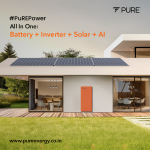I don’t know about you, but I’ve lost count of how many times I’ve been in the middle of something—like blending chutney or watching a match’s final over—only for the power to disappear like a bad magic trick. India’s power cuts are kind of like that one friend who says they’ll come “in five minutes” but shows up an hour later. You just never know when they’ll strike. And that’s exactly why people are finally waking up to the importance of having power backup solutions for home.
See, earlier it used to be fine. A few candles, maybe a battery fan if you were lucky, and you’d just wait it out. But now everything in a house depends on electricity—your WiFi router, your fridge, even your doorbell camera. Losing power for a few hours can actually mess up your entire day. It’s not just about comfort anymore. It’s about staying functional.
The New Indian Household Problem
We’ve entered this phase where most homes look like small tech hubs. Laptops charging, smart TVs streaming, Alexa listening, and someone’s always working from home. Power cuts don’t care about your Zoom call or your toddler’s online class. It’s like we’ve become too dependent on gadgets to go even an hour without electricity. And that’s where backup solutions are kind of the unsung heroes.
Now, people usually think “backup” just means an inverter or a generator, right? But that’s old-school thinking. The whole energy scene is changing, and you have smarter, cleaner, quieter options. Some even use solar energy to recharge, which makes you feel like you’re doing something good for the planet instead of just burning fuel.
A Little Reality Check
Here’s something people don’t talk about enough—power cuts aren’t only a rural issue anymore. Even big cities like Bengaluru or Gurugram face random outages during heavy rains or peak load hours. And here’s the fun part: the more dependent we become on devices, the more fragile everything feels when power goes out. It’s like building a digital life on a shaky WiFi connection.
I’ve seen families scramble during blackouts, searching for candles, phones dying, kids complaining because Netflix froze mid-episode. It’s funny in hindsight, but in the moment, it’s chaos. Having a proper home power backup system isn’t luxury—it’s common sense now.
Inverters vs Solar vs Batteries: The Confusing Trio
People always ask, “What’s best for my home—an inverter, a generator, or solar?” And honestly, it depends. Generators are like that old relative who’s loud and smells like diesel but gets the job done. They’re powerful but messy, noisy, and not exactly eco-friendly. Inverters are quieter and more convenient, though they rely on batteries that need proper maintenance. Solar systems, on the other hand, are the cool new kids—quiet, clean, and increasingly affordable.
If you live somewhere with long power cuts or unreliable supply, investing in a hybrid setup (like inverter + solar) is actually a game-changer. It charges your system during the day using sunlight, so when the power’s out at night, you’re basically living on sunshine.
A Quick Look at What’s Trending
Scroll through any home improvement forum or even Reddit threads, and you’ll see how much buzz there is around energy independence. People are sharing how they built mini solar setups, some even powering entire apartments off-grid. There’s a definite shift in mindset—people don’t want to rely fully on state electricity boards anymore. They want control.
And yeah, social media has made this whole topic a bit more fun too. There are videos comparing inverter brands, unboxing battery units, and even aesthetic solar roof setups that look like something out of a tech influencer’s vlog. It’s not boring “engineer talk” anymore. It’s lifestyle talk.
Costs and Savings: The Part Everyone Cares About
Let’s be real—money decides most things. A solid inverter-battery setup for an average home can cost around ₹25,000–₹40,000, while solar solutions might go up to a lakh or more depending on how fancy you get. But here’s the trick—once you install a good system, your electricity bills start to drop, and maintenance costs are minimal compared to running a generator. So, it’s more like spending now to save (and stay sane) later.
Also, the government keeps pushing incentives for solar adoption, which makes it even more appealing. Plus, you’ll feel that tiny rush of pride every time you realize your fan is running on sunlight instead of a power grid struggling to keep up.
One Thing People Forget: Battery Quality Matters
I’ve seen so many folks go cheap on batteries just to regret it later. The battery is literally the heart of your backup setup. A bad one dies early, leaks, or gives you poor backup time. Brands like Pure Energy (yep, the same guys at power backup solutions for home) are focusing on high-efficiency lithium batteries that last longer and charge faster. Lithium batteries are lighter, safer, and handle more cycles compared to old lead-acid types.
It’s a bit like the difference between using a basic smartphone and a flagship one. Both do the job, but one just makes life smoother.
The Silent Comfort of Always-On Power
There’s this underrated peace you get when you know the power cut won’t mess with your day. You can keep working, your fridge stays cold, and your ceiling fan doesn’t abandon you mid-summer. It’s such a small thing, but it makes life feel stable. Especially when everything else already feels unpredictable—traffic, weather, your neighbor’s wedding DJ at 11 PM.
Final Thought (Not Really a Conclusion)
Honestly, I used to think backup systems were for fancy homes until one random evening my inverter kicked in during a blackout, and I could still make tea while my neighbors sat in the dark. That moment sold me. These things aren’t just about convenience—they’re about control, reliability, and a bit of everyday peace.









